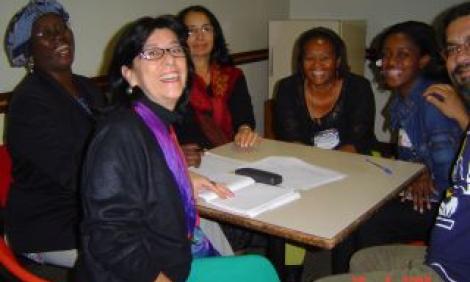In depth
The contented and the discontented: internet content regulation
By Jorge Bossio
What does it take to regulate content on the internet? The apparently unruly character and development of the internet and accompanying technologies have been argued as defeating any efforts to truly govern how content is circulated in this space. Nonetheless, censorship and regulation is real. Here, Jorge Bossio examines various categorisations of content that enables their regulation, as well…
In depth
Mommy knows best, or perhaps the church, or maybe the school? A conversation on online content regulation
By Mavic Cabrera-Balleza
Who decides on what we should see and not see online? Should parents decide on behalf of their children? Or should it be the church? Or the school? Are women and children better left alone? Mavic Cabrera-Balleza, Senior Programme Associate of the International Women’s Tribune Centre and a member of the GenderIt blogging team at the first Internet Governance Forum (IGF) that took place in Athens,…
In depth
Content, Contingencies and Conflict on the Internet
By Cecilia Gordano
As both a mirror and an extension of social relationships, the internet’s virtual space differentiates itself from traditional media by its decentralised and open architecture. This subverts power relationships between citizens, institutions, governments and markets. Confusion. Impunity. Unbounded freedom. Can and should this anthill be organised? What is the ethical reach of doing so? This…
In depth
Pakistan’s Web of Censorship
By Reba Shahid
The internet has become a critical space for ordinary citizens in Pakistan to speak their minds, and exchange information. These include women who sharpen their ICTs skills and turn to weblogs as a platform for articulation of their concerns and daily lives, and to engage in conversations sometimes blacked out as ‘taboo’. But is this relative ‘freedom’ under threat? This article presents an…
In depth
Women and Philippine Media: At the Fringes of Freedom
By
Where are women located in the struggle for freedoms to express, create and disseminate information through ICTs as media? Censorship comes in multiple forms in the Philippines. The country has one of the highest counts of media practitioners who are killed in the course of their work in the region. Yet, it retains a conflicting standing as one of the open media landscape in South East Asia.…
In depth
National Gender and ICT Policies in Uruguay: A Call To Action
By Cecilia Gordano
In Uruguay, the National Women’s Institute (INAMU) led a consultation process with a range of social actors to develop the First National Plan for Equality of Opportunities and Rights (PPNIOD), planned for the period from 2007 to 2011. One of the chapters of the Plan, entitled “Innovative Uruguay”, includes the strategic aim of an “increase in women’s access to information and communication…
In depth
In search of Gender inclusive ICTs in Pakistan: But Where?
By
This article briefly looks at the need to integrate gender into gender mainstreaming efforts by the Pakistan government in ICT policy implementation. In particular, it explores the potential of the private sector as a significant initiator of this process, citing Responsible Business Initiative as an noteworthy example.
In depth
Doing IT on Paper
By Reba Shahid
This article examines the discrepancy between Pakistan's national IT policy and the reality of access and use on the ground. It argues a case for the revision of this policy by taking into existing account socio-cultural inequalities.
In depth
Gender and ICT Policy in Bosnia and Herzegovina: Re-thinking ICT development through Gender
By Jac sm Kee
This article examines the current ICTs situation in Bosnia and Herzegovina, paying particular attention to the development of a National ICT Policy Strategy, and the responses towards the need to integrate gender concerns by both the women's national machinery and civil society organisations.
In depth
Tools discussed: Gender and ICTs in education and communication
By Denise Gomide
More than 40 educators debated the importance of ICTs in edu-communication processes at a recent workshop held in Sao Paulo.The benefits of new information and communication technologies (ICTs) tools and platforms were analysed, including their democratising potential and gendered environment. The workshop was conducted through a Gender Evaluation Methodology (GEM) tool that, like its namesake,…












